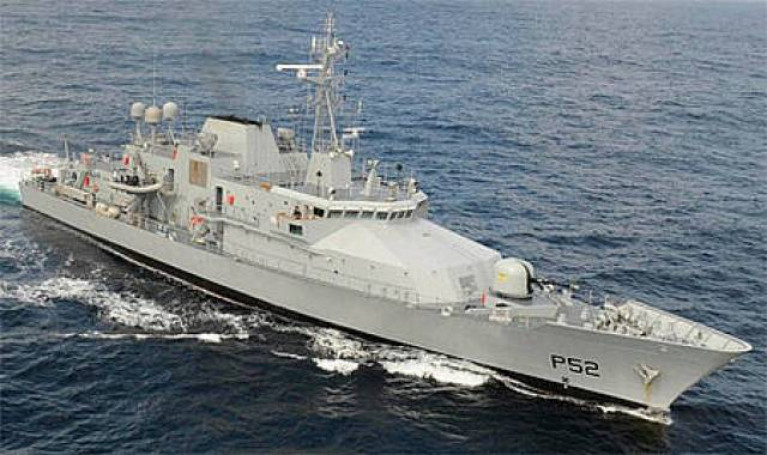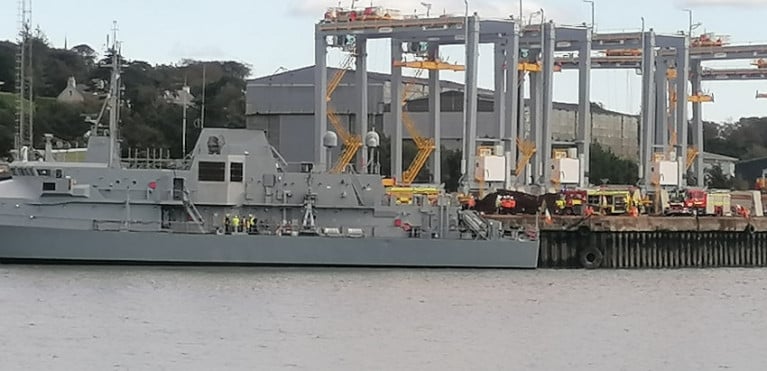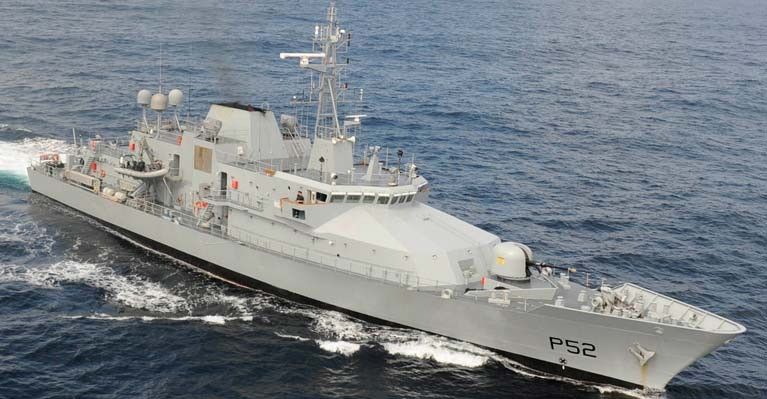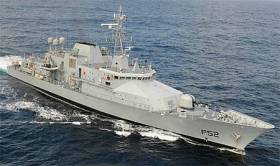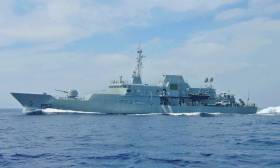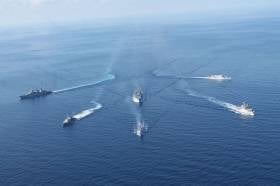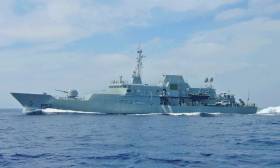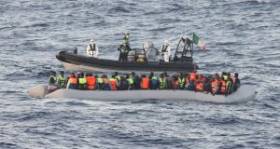Displaying items by tag: LE Niamh
Since the start of the year, the Naval Service, which was only able to have in operation a single patrol ship within Irish waters, could have two more vessels made available within a matter of weeks.
Due to a combination of not having key crew and mechanical issues, this has severely impacted the operations and ability of the Cork Harbour-based Naval Service. As only a single vessel has been dispatched from the naval base on Haulbowline to carry out key duties that cover drug interception duties, fishery stock monitoring, as well as (SAR) search and rescue.
According to Michael O’Sullivan, the former director of Europe’s Maritime Analysis and Operations Centre, Narcotics MAOC (N), based in Lisbon, Portugal, said “by not resourcing our navy, we have handed the keys of the country over to the drug cartels to do with us what they wish.”
According to the Irish Examiner, which has more on the story, a second of its larger ships, possibly the OPV80 P50 class LÉ Niamh, could return to patrol service within the next few weeks.
Navy to Carry Out Investigation Over Fire On Board L E Niamh
The Naval Service is carrying out an internal investigation into the fire on board the LÉ Niamh moored alongside Cork Dockyard at Rushbrooke in Cork Harbour which occurred on Saturday.
As Afloat reported earlier, Fire service Units from Cobh, Midleton, and Cork City were called.
Defence Forces Press Office said no injuries to naval service personnel or Cork Dockyard staff.
"While a full investigation into the cause of the fire will be conducted, it is thought to have started in a stores compartment adjacent to where cutting work was being carried out by engineers," the spokesperson said."The ships Duty Watch responded to the alarm and carried out firefighting to contain the fire and prevent any spread.
Blaze On Naval Service’s LÉ Niamh Brought Under Control
Independent.ie reports that a fire which broke out on a Naval Service vessel in Cork Harbour has been brought under control — but the scale of the damage could be significant.
It’s understood that the accidental blaze started in a storage compartment of the patrol vessel LÉ Niamh, which is moored alongside Cork Dockyard at Rushbrooke, shortly before lunchtime today, Saturday 3 October.
Fire brigade units from Cork city and county attended the incident, which was also handed by Navy firefighters. No injuries have been reported.
Weather Forces Change of Venue from Ship to Shore for Sunrise Musical Performance as Part of Galway 2020
Near gale force and gusty south-west winds have forced a change of venue for a Galway 2020 International Women’s Day event on board the Naval Service patrol ship LÉ Niamh on Sunday morning.
The patrol ship was to have hosted “Ragadawn”, an outdoor sunrise performance by international poet and sound artist Caroline Bergvall.
However, due to the potential impact of the wind on the sound systems, the sell-out event will now take place in the Druid Theatre, Galway at 7 am on Sunday, March 8 th – within walking distance of the ship at Galway docks.
LÉ Niamh arrived into Galway under the command of Lieut Cdr Claire Murphy on Thursday in preparation for international women’s day.
It is almost 12 years since Lieut Cdr Roberta O’Brien became the first female commander of a navy patrol vessel – the LÉ Aisling - and that handover ceremony took place in Galway, the city which the ship had been twinned with.
Galway 2020 cultural producer Liz Kelly has paid tribute to the Naval Service and Galway harbourmaster Capt Brian Sheridan for agreeing to participate in the event.
“Ragadawn” is described as a unique outdoor sunrise performance by international poet and sound artist Caroline Bergvall.
It comprises a “multisensory composition for two live voices, a dawn chorus of multiple recorded languages, alongside a special vocal work for soprano by Gavin Bryars”, and it “invites audiences to follow the slow rising of day”.
The composition draws on “ancient and contemporary musical and literary sunrise traditions”, with “breath patterns, poetic voice, song, languages, electronic frequencies and passing sounds”
It aims to recall “the cyclical patterns that connect all beings both to nature and society, and the awakening of mind and body”, and is described as “a powerful and moving voice performance that reconnects audiences to time, place and to each other”.
The event is one of a number programmed by Galway 2020 over this weekend to mark international women’s day.
#navy - LÉ Niamh an offshore patrol vessel of the Naval Service is in the Port of Galway this week and is offering the public guided tours.
The OPV writes GalwayDaily will be alongside Galway this today and Friday, with the crew taking members of the public of the navy patrol ship between 1pm and 5pm.
LÉ Niamh is the second Róisín class ship built (Appledore, UK) for the Naval Service and to the same long (78.8m) design of older leadship that optimises her performance in rough Irish waters.
For more click here including a career drive to rise recruitment click this link for further information.
Naval Service Vessels Kept At Base Due To Crew Shortages
#Navy - According to The Irish Times, two Naval Service vessels were prevented from leaving their Haulbowline base last week due to crew shortages.
The LÉ Orla and LÉ Niamh were both kept at their docks while reserve members were drafted to cover shortages on the flagship LÉ Eithne.
Last week’s situation — linked to a reduced level of personnel retention — is a symptom of a bigger problem within the Defence Forces, The Irish Times reports, with one lieutenant colonel saying the command structure “is breaking down”.
The Irish Times has much more on the story HERE.
L.É. Niamh Arrives Home in Time for Christmas Having Carried Out Historic Naval First Operation
#LENiamhHomecoming - L.É. Niamh returned to Cork Harbour anchorage overnight just in time for Christmas, having carried out a new historic first for the Irish Naval Service in the participation of Operation Sophia, writes Jehan Ashmore
Afloat continued tracking the OPV80 'Róisín' class patrol ship as of this mid-morning, L.É. Niamh weighed anchor in lower Cork Harbour to make the short passage to Haulbowline Naval Base and under the escort of tug, Gerry O'Sullivan. On board were a 55-strong crew planning to wear Santa hats under the command Lt Cdr Stuart Armstrong. Awaiting them were families and loved ones looking forward to sharing the festive period.
As previously reported on Afloat, the OPV80 class L.E. Niamh had departed Cork in October for the three-month deployment. This involved working as part of European Naval Force Mediterranean - Eunavfor Med Operation Sophia that consisted of a six-strong naval flotilla task force off the coast of Libya to neutralise people-smuggling operations.
Operation Sophia saw the interception of boats used by the smugglers from the Libyan coast and returning the migrants to north Africa.
In late November, the Eunavfor flotilla met to conduct exercises and crew exchanges taking advantage of tactical situations. During this rendez-vous, they kept performing operational tasks, obtaining information and controlling maritime traffic.
Last week, the Spanish auxiliary supplies ship Cantabria moored in Taranto, an Italian Naval base. On board a command change ceremony took place of Operation Sophia Task Force that saw the transfer from the Spanish to the duty of Force Commander of the Italian Navy.
Afloat also last week tracked down L.É. Niamh when south of Sicily, as the OPV had departed from the Ionian Sea port of Augusta on the Italian mainland.
LÉ Niamh Departs On New Med Mission To Intercept Migrant Boats
#Navy - The LÉ Niamh is headed for the Mediterranean today (Friday 6 October) for the Naval Service’s first ever role in an operation directly targeting human traffickers.
As BreakingNews.ie reports, the EU mission Operation Sophia aims to intercept boats used by people-smugglers from the Libyan coast and return migrants to North Africa.
However, the pivot away from rescue missions has been criticised by Sinn Féin’s defence spokesperson Aengus O'Snodaigh, who cites “appalling” conditions for returned migrants in Libyan detention centres.
#MinisterDefends - Paul Kehoe Minister of State for Defence has said he was immensely proud of the Naval Service as the LE Eithne and its crew prepared to depart for the Mediterranean to assist in the rescue of refugees fleeing north Africa and the Middle East.
As the Irish Times writes Mr Kehoe believed Ireland should continue to assist Italy in a practical manner in as far as possible and the Italian authorities have welcomed this support which will see the patrol vessel LE Eithne under Cmdr Brian Fitzgerald return to the Mediterranean to assist with the rescues of migrants.
“As Minister with responsibility for defence, I feel immensely proud of the crew members that are going out to the Mediterranean this morning – over the last number of years, we have seen the immense difference that the Irish Naval Service have made in rescuing migrants,” he said.
The rescue operations began in May 2015 when the LE Eithne departed for the Mediterranean and rescued some 3,377 migrants, and since then Naval Service ships have rescued a further 12,071 to give a total of some 15,448 people the Naval Service has saved in Operation Pontus.
But Mr Kehoe would not be drawn on controversy that emerged last week at the trial in Sicily of three men accused of people trafficking when the Italian authorities criticised the LE Niamh for not venturing inside Libyan territorial waters in the course of a rescue operation in August 2015.
For much more click the newspaper's report here.
Migrant Crisis: Irish Navy's LÉ Niamh Rescues Hundreds Off Libyan Coast
#MedRescue - Irish Naval Service personnel came to the rescue of around 380 migrants across three operations in the Mediterranean on Friday (18 September), as the Irish Examiner reports.
The responses off the Libyan coast – which included the rescue of 124 and 127 people respectively from inflatable craft, and saving 129 from a sinking dinghy – bring the LÉ Niamh's total rescued to 3,723.
That tops the number saved by sister ship the LÉ Eithne, which returned from its nine-week deployment in July.



























